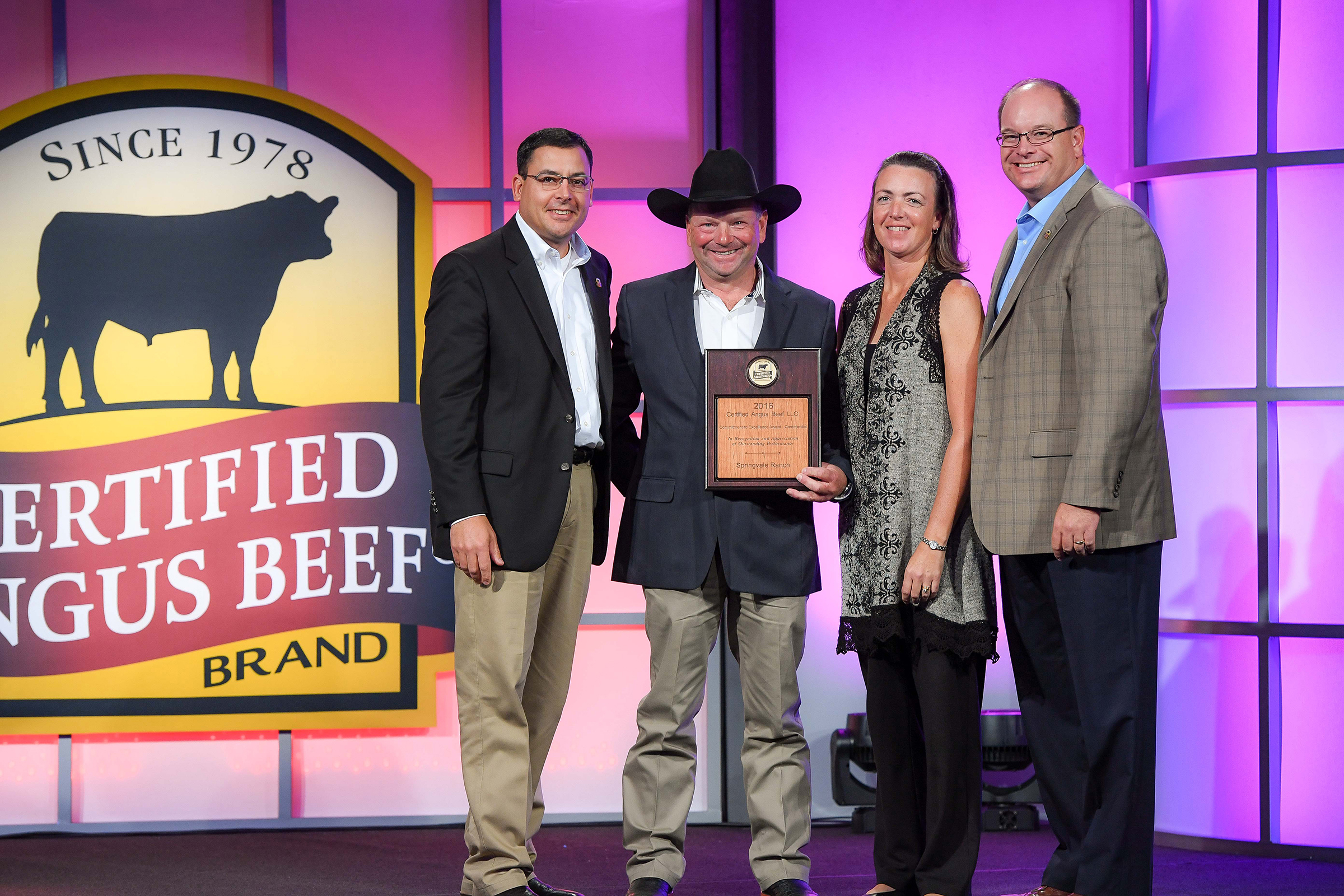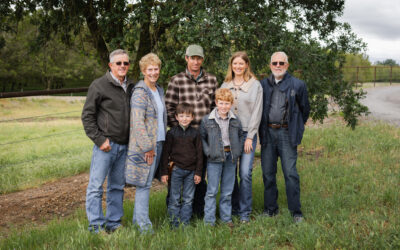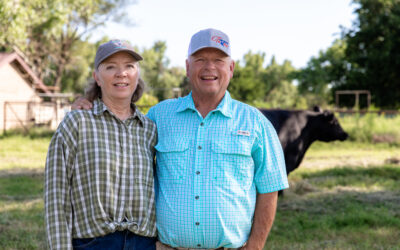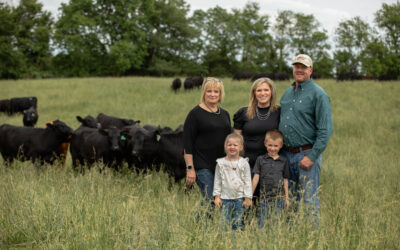
Montana Angus ranch: data-driven quality from the start
2016 CAB Commercial Commitment to Excellence Award
by Miranda Reiman
It’s hard to pinpoint when the transformation began, but on the Christensen family’s western ranch, it’s evident that it happened: a commitment to excellence.
The views of the Rocky Mountains look much the same as they did when Grandpa Karl homesteaded near Hot Springs, Mont., a century ago, but third-generation rancher Shawn Christensen and wife Jen now raise their two daughters there.
Ranch talk might center around the same challenges then and now, from lack of moisture to grasshoppers, but a quick glance at stacks of artificial insemination (AI) records and carcass data provides a clear distinction. The diversified crop and livestock farm that once housed milk cows and chickens is not the same as the commercial Angus ranch the family operates today.
Shawn’s dad brought in Angus bulls and then switched to the breed completely in the 1970s, a decade later Shawn participated in the 4-H carcass contest and later learned to AI.
There might not be one central event, but there’s evidence of the fruits of that commitment.
“They’ve just been good gaining and good converting cattle,” says Ryan Loseke, of Columbus, Neb. He’s bought the family’s cattle for most of the last 20 years. “It’s been neat to see how he has done a good job of maximizing carcass quality but not getting poorer performing cattle.”
Loseke specifically remembers the pen that went 100% Choice and Prime. It also made 65% Certified Angus Beef ® (CAB®) brand, and gained more than 4 pounds (lb.) per day.
That kind of cattle and the lifelong dedication to produce them earned Shawn and Jen Christensen’s Springvale Ranch the 2016 CAB Commercial Commitment to Excellence Award, which they accepted Sept. 24 at the brand’s annual conference in Tucson, Ariz.
“He’s always thinking and always evaluating and looking for ways to improve his genetics and his management, too,” says Ben Eggers, manager of Sydenstricker Genetics, Mexico, Mo. “Kind of a student of the Angus breed, really.”
For Christensen, the award is gratifying, a validation of the vocation that he’s made his life’s work.

“When I was 3 years old, I wanted to be an airplane pilot,” he says. “It was pretty obvious I was ready to want to be a rancher when I was probably 4 years old. I think ever since I haven’t really changed my mind.”
Christensen got an early start, helping his dad do everything from watch gates to rake hay. As a teenager he started making business decisions, as his dad focused on growing an irrigation business.
“He kind of says, ‘Okay, you’re going to build this program,’” the son recalls.
At first Christensen studied sale books and sent his dad to the sale with a wish list. Then he was making decisions himself, but his dad’s influence remained.
“That’s how we were raised. Whatever you are doing, you want a product that the consumer wants,” Christensen says. “We are raisers of beef, but you still have to raise cattle that can calve out on the range, get bred back during a drought, and go on to the feedlot and have a feedlot want to come back and purchase your cattle.”
When he became an AI tech in 1983, it was a two-fold purpose: tightening calving season while individually assigning specific sires to certain cows.
“We’ve always raised our own replacements….” Christensen starts, as Jen continues, “…he knows the cowherd many generations back. To look at an AI bull, he knows what that cows’ milk or marbling has done for many generations. It’s not that he just sees the cow’s numbers on paper.”
Jen says she doesn’t catch her husband reading the latest best seller. Instead, free time is devoted to researching genetics.
“He spends a lot of time perfecting that,” Jen says. She then hand-enters all records so he can study the Excel spreadsheets.
“If you don’t know who the good one is or the poor one is, how do you make changes?” Christensen asks. “It seems like you can make it happen in a few years, but it takes time.”
Getting connected with the Loseke family gave them the ability to get individual tag-transfer data.
“That’s when I was able to really see what sires are doing and what the cowherd’s doing and trying to make small adjustments,” Christensen says, while trying to ensure he’s being “budget-minded and dollar-driven for everybody in the industry.”
Loseke tries to buy the straight Angus cattle every year. They gain and grade and, “disposition-wise, there’s hardly any better. Because of that, they wean well,” the feeder says.
Fifteen years ago the cattle reached 71% Choice, with 25% CAB acceptance. Today very few miss the Choice mark and 65% of them meet the brand’s 10 specifications. Carcass weights have improved 73 lb., with a younger calf crop, while mature cow weight has gone unchanged.
“He’s a commercial guy that’s pretty rare, really, that believes in turning in the data to improve the accuracy on the bulls he buys,” Eggers says. “Shawn’s one of those guys who believes in doing things right.”
Maybe the best way to describe the herd’s change through the years is more of a natural progression. The cattle are simply an expression of who Shawn Christensen is at the core.
You may also like
Legacy in the Golden Land
On a quiet stretch of Northern California rangeland, a different story unfolds. The Borror family’s legacy modestly speaks through the cattle they raise, the ground they steward. The generations who’ve made a life here demonstrate commitment to doing things right, even when no one is watching.
Helping Hands, Helping Herds
“When I die, I want to come back as one of your cows,” murmurs a friend to Steve Zybach. Full to the brim from an alfalfa ration every day, bountiful fields of lovegrass stretched out across the Texas Panhandle—and owners who leave no ounce of cattle care up for question. The Zybachs’ motivation for this level of dedication to their Angus cattle is simply love.
An Ambassador for All
Joanie, with daughter Lindsey and her husband, Adam Hall, raise registered Angus cattle with two primary goals: producing high-quality seedstock that perform well in a wide variety of environments and ensuring end-user satisfaction. Those goals tie everything together, from promoting Angus to other producers to sharing their story with CAB partners and beef consumers.



